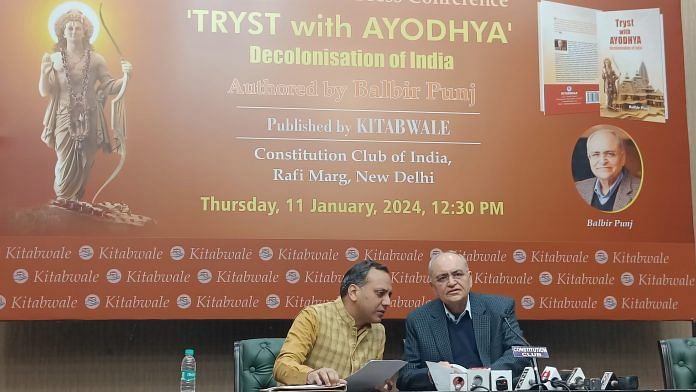New Delhi: For former Rajya Sabha MP Balbir Punj, the demolition of Babri Masjid on 6 December 1992 was a “Gandhian solution” to the Ram Janmabhoomi issue. He drew this conclusion from an article in Young India—a weekly journal published by Mahatma Gandhi—which argued that any structure, including a mosque, could be demolished by the landowner if it was forcibly built on someone else’s land.
In 1925, Gandhi was asked what to do if a mosque was forcibly built on a piece of land owned by somebody else. “His response was incredible. Gandhi said that if ‘A’ is in possession of his land and someone comes to build some things on it, be it even a mosque, ‘A’ has the right at the first opportunity to pull down the structure,” Punj said at Delhi’s Constitution Club on Wednesday, ahead of the release of his book, Tryst with Ayodhya: Decolonisation of India. The book will be launched by Defence Minister Rajnath Singh on 13 January, and is one of the many works on Ayodhya that have been slated for release to coincide with the consecration of the Ram Mandir on 22 January.
“As long as I own property, I must defend it whether by the force of law courts or by the force of my own strong arms,” said Punj, quoting Gandhi’s 1925 article in Young India.
On 6 December 1992, a mob of kar sevaks demolished Babri Masjid in Ayodhya. “First the kar sevaks chose the court route, and then when they gained strength, they demolished the structure,” Punj said. More than 30 years later, the temple will be consecrated on 22 January.
The former MP, who once held the national vice-president post in the BJP, also blamed India’s first prime minister, Jawarharlal Nehru, and Congress leader Raghav Das for politicising the issue. “Govind Vallabh Pant and Lal Bahadur Shastri, who were in the state government at that time, all wanted Ram temple but only one person was opposing it—Nehru,” Punj alleged. “When opposition to the Ram temple grew, it became politicised. Nehru was at the forefront of those who protested,” he further claimed.
In his book Tryst with Ayodhya: Decolonisation of India, Punj writes about the “resistance” to the construction of the temple, which he claimed was stirred by a colonial mindset that “survived the departure of Islamic and British invaders”.
“So called eminent historians have written against Ayodhya in their books. And this is the result of colonised minds. The Ayodhya dispute was avoidable and the Ram temple would have come up at the Janmabhoomi site without any problem after Independence,” said Punj.
According to Punj, the temple in Ayodhya sends a powerful message: the end of the colonisation in Bharat.
Also read: Ram Aayenge is the new Ayodhya anthem. But race to sing at Ram temple opening heating up
Blaming Congress, Nehru
Punj attacked the Congress for refusing to attend the consecration of the Ram temple citing it as part of BJP’s politics, but claimed he was not surprised. “If Congress calls itself a devotee of Ram, it should be called a maaya (illusion) because in 2011, Congress had called Ram imaginary in the Supreme Court,” he said.
His book discusses the history of Ayodhya dispute, how India and Ram are “intertwined”, and the havoc caused by those in power with a colonised mindset. He again attacked Nehru for what he called the party’s “hatred towards Hinduism” and its traditions.
“Congress policy towards Hinduism has been a queer mix of opportunism and in-built hate for Hinduism,” said Punj.
Punj listed two reasons behind the Congress’ decision to not participate in the inauguration of Ram temple. “There is ideological opposition and the second immediate reason is how Rahul Gandhi will win the elections in Wayanad [Kerala] because Muslims are more there. What can be expected from those whose political base is anti-Hindu and rests on the fundamentalist section among Muslims,” the BJP leader said.
According to Punj, in 1947, Patel talked to Gandhi about rebuilding the Somnath temple and the latter supported it. Nehru also agreed to this in the cabinet meeting. But Gandhi was assassinated in 1948 and Patel died in 1950. “And with that, Nehru virtually became a dictator in the Congress,” he alleged.
He also used the opportunity to counter the Congress party’s stance that it was Rajiv Gandhi who facilitated the unlocking of the Ram temple. The truth, Punj claimed, is that the lock was opened in 1986 after a court order.
Punj wrote the book in four months. “If there is any mistake, I am responsible for it. But if people like it, it is because of Ram,” he said.
(Edited by Prashant)



